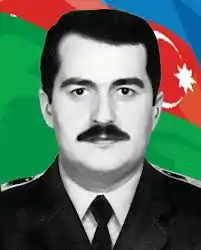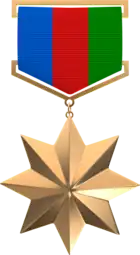Arastun Mahmudov | |
|---|---|
 | |
| Native name | Ərəstun İspəndi oğlu Mahmudov |
| Born | 23 February 1957 Ismailly, Azerbaijan SSR |
| Died | 28 January 1992 (aged 34) Shusha, Azerbaijan |
| Allegiance | Republic of Azerbaijan |
| Service/ | |
| Years of service | 1991–1992 |
| Battles/wars | First Nagorno-Karabakh War |
| Awards | National Hero of Azerbaijan 1992 |
Arastun Ispandi oghlu Mahmudov (Azerbaijani: Ərəstun İspəndi oğlu Mahmudov) (23 February 1957, Ismailly, Azerbaijan SSR – 28 January 1992, Shusha, Azerbaijan) was the National Hero of Azerbaijan and warrior during the First Nagorno-Karabakh War.[1]
Early life and education
Mahmudov was born on 23 February 1957 in Pirabilqasim village of İsmailly raion of Azerbaijan SSR. He moved to Baku with his family. In 1970, he completed his secondary education at the Secondary School No. 220 in Baku. In 1975 he entered the Civil Aviation School in Leningrad Oblast.[2]
Family
Mahmudov was married and had three children.[2]
First Nagorno-Karabakh War
On 28 January 1992, the Azerbaijani transport helicopter Mil Mi-8 operated by Mahmudov was reportedly shot down by Armenians near the town of Shusha. As a result of shot down, Mahmudov was tragically killed together with the whole crew.[2]
Honors
Arastun Ispandi oghlu Mahmudov was posthumously awarded the title of the "National Hero of Azerbaijan" by Presidential Decree No. 337 dated 25 November 1992.[1]
He was buried at a Martyrs' Lane cemetery in Baku. The secondary school No. 220 where he studied was named after him. In 2018, a documentary titled Battles in heaven was released. The documentary looks into memorials surrounding the lives and battlefields of Arastun Mahmudov.[2]
See also
References
- 1 2 "National heroes". swhs.az. Archived from the original on 23 January 2019. Retrieved 24 January 2019.
- 1 2 3 4 "MAHMUDOV Ərəstun İspəndi oğlu". Avciya.az (in Azerbaijani). Archived from the original on 24 January 2019. Retrieved 24 January 2019.
Sources
- Vüqar Əsgərov. "Azərbaycanın Milli Qəhrəmanları" (Yenidən işlənmiş II nəşr). Bakı: "Dərələyəz-M", 2010, səh. 179.
